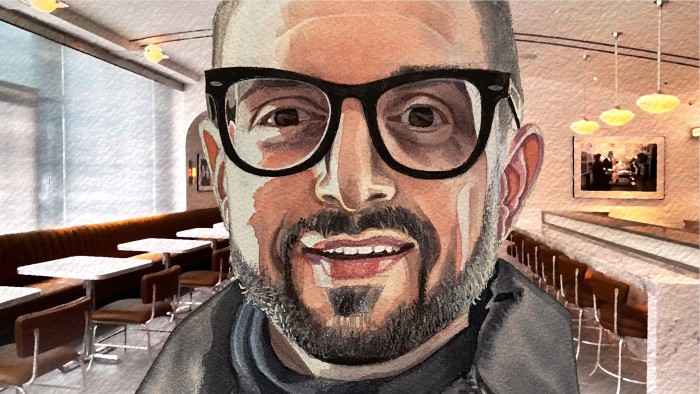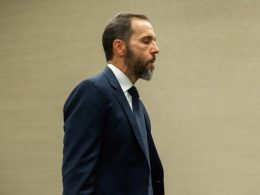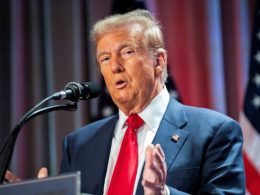The Jewish deli on Manhattan’s Lower East Side seems an unlikely choice for lunch with a billionaire liberal megadonor. As we wait to be seated at Russ & Daughters Cafe, my guest, Alex Soros, dives into the history of Jewish delis in New York, a subject in which he prides himself on being a connoisseur.
Beyond the neon lights flashing the diner’s specialities — schmaltz herring, sardines, pickles — lies a storied family history and the realisation of the American dream. The café is the “sit down” option of a New York City institution started over a century ago by a Polish Jewish immigrant who first sold herring from a barrel. It is known for serving the best bagel and lox in town, though a breakfast of caviar and vodka is available too.
History matters to Soros, the 39-year-old heir to the multibillion-dollar empire built by his famous investor and philanthropist father George, now 94. The Hungarian Holocaust survivor and hedge fund pioneer made a fortune on big investment bets, including famously shorting the British pound in 1992. He founded the Open Society Foundations to promote democracy and human rights in central and eastern Europe and, over time, powered it with $32bn of his wealth.
In December 2022, Alex was handed the reins to the vast donor network that carries sweeping influence but comes with a cost: admired by progressives around the world, his father is also vilified by the right as the head of a global conspiracy, a characterisation that is laced with antisemitic undertones.
Alex Soros is, like his father, a major figure on the left in America (a “radical nepo baby” to his Republican opponents). He and his father were some of the largest donors to the Kamala Harris campaign; they spent more than $85mn in the 2024 election cycle. Some might say he is the Elon Musk of the liberals, but one who lost an expensive bet.
Soros is as fiercely unapologetic about political funding as he is about backing Harris. “I’m happy to get money out of politics, let’s go, let’s do it tomorrow . . . campaign finance reform, and have it regulated like it is in Europe.” He says he wishes “more people would do what we do” — a veiled reference to others who have rushed to please Donald Trump — rather than “cower to somebody that has contempt for you anyway, which is what I think people are doing”.
Soros has been counselling against despair: it was the cost of living, incumbency and a shifting media environment that doomed the Democratic bid for the White House; Harris ran the “best campaign she could” but could not “reverse-engineer her way out of incumbency”.
We are led to a booth at the far end of the diner and Soros tells me he’s been having Russ & Daughters bagels since his youth, and still orders from one of their delis. It’s bitingly cold in the city and Soros is layered in a black wool turtleneck, grey wool jacket and coat. With his black thick-rim glasses, stubble beard and quiet, sometimes muffled voice, the young man with a doctorate in modern European history has a nervous energy. His discourse, shifting between hesitant and assured, is peppered with historical references.
More than a decade ago, his elder half-brother Jonathan appeared more likely to succeed George. Yet Alex, one of five children, says that he’s always had a special bond with his father. For years, he would accompany George on foreign trips, and take notes in meetings with foreign leaders. “He called me his apprentice, I think it was sort of a joke about Trump also.”
Eventually, George didn’t want to travel beyond Europe and Alex represented him, bringing his father the notes of his meetings. It was a relationship “unlike any of his other children, maybe unlike anybody else he had in his life, because he would tell me things”, Alex confides. He was on a trip to Latin America for his own philanthropic work when he got the call that would determine his future. “This was the spring of 2015 and I went to see him in London and I showed him all the pictures of Peru and the Amazon and being in Colombia, and then he said, ‘Can you come with me to Paris?’ I basically never left.”
Today, Soros heads the OSF and is the only family member on the investment committee of Soros Fund Management, the investment firm that manages family money as well as the foundations’ endowment. Those who know George say he saw in Alex a risk taker, even if not a trader. “My parents accepted that I was going to inherit money so [the message was] do something with your life.”
Alumni of the hedge fund include Scott Bessent, Trump’s pick for Treasury secretary. Soros says he doesn’t know Bessent well, but he recalls delivering the latter’s mail when he interned at the firm. He’s not surprised by the choice (Steven Mnuchin, Trump’s Treasury secretary in his first term, also worked at the Soros fund). Trump had “a sort of fixation” with his father and other New York wealthy families “because he wanted to be part of that club” — or “maybe take it down”.
Soros and I both order the “Classic” board, which seems the most expedient on the menu. It consists of toasted bagel, smoked salmon, cream cheese, tomatoes and onions and capers. Soros insists that I should try Russ & Daughters’ pickles. He warns that he’d had a quick bite before our lunch because it seemed prudent not to be interviewed on an empty stomach. Resigned to the fact that this feels more like a breakfast at 1pm, I order orange juice and Soros sticks to coffee.
Menu
Russ & Daughters Cafe
127 Orchard Street, New York, NY 10002
Classic board (plain bagel) $22
Classic board (everything bagel) $22
Sours $8
Orange juice $7
Coffee $5
Total (inc tax and service) $85.67
Though he is an avid social media user, profusely posting political reflections and updates on meetings with world leaders, Soros rarely gives interviews. Since taking over, he has wielded the axe, massively downsizing staff numbers. The turmoil has fuelled discontent within the organisation, disgruntlement among longtime grantees in Europe and rumours that Soros fils lacks his father’s commitment to Europe.
Nonsense, says Soros. “My father didn’t want to create an employment agency, he wanted to create a network of networks and he was very upset with the amount of bureaucracy at the foundation . . . My only regret is that we didn’t do it faster, because I feel like he wanted that.”
By 2017, OSF staff numbers had swelled to 1,700; now they hover around 500. Total donations, says OSF, will continue to be about $1.2bn a year. Soros insists that he is a committed European, pointing to OSF’s expanding work in Ukraine. But since he took over, the foundation has focused more on climate and green jobs and increased spending in the US to civil rights groups that work on issues such as immigration, the right to vote and political inequality — all seen in a polarised America as loyal Democratic causes.
If George’s world view, and his work, were shaped by the second world war and the postwar international order — “I joke around with him that he never saw a transition he didn’t like,” his son says — Alex’s has been most influenced by the struggle for civil rights and equality. His father’s philanthropy started in South Africa and the struggle against apartheid, and Alex met Nelson Mandela at a young age.
“Mandela’s story of South Africa becomes the freedom story for me, in many respects,” he says, adding that, for an American foundation, a focus on the US makes sense at a time when the struggle for justice and civil rights is urgent. “My father was more about how you get closed societies to become open, and my task within the foundation is how do you renew open societies from within?”
The liberal order that OSF has long supported is under threat, challenged as never before by a rising tide of nationalist populist forces. Cherished causes — from immigration to equality, justice to minority rights — are sneered at as a “woke” culture that has corrupted society and held back progress.
Soros refuses to accept that history is turning and that democratic regression is inevitable. “Trump represents everything we don’t believe in but I would push back on the nostalgia.” He says he recognised while growing up that he lived in the “greatest time” in the history of his own family. “But I never took it for granted because you were told never to take it for granted, that it could come back. So when Trump won the first time I felt very much that my upbringing had prepared me for these types of situations.”
He admits to feeling some rare “end of history” moments, such as the election of Barack Obama, which led some people to think that the fight against racism in America had been won. “And next came gay rights, and I remember walking down the street in Rome, seeing the American embassy with a rainbow flag, and just thinking how proud I was of my country.”
I have gobbled down my bagel, satisfied that it may be the tastiest I’ve ever had in New York, but Soros continues to eat in small, hesitant bites. I want to know whether he’s afraid, for himself, for the foundation, of what Trump might do to enemies he considers part of the “deep state”. Soros says he is in a reflective, “agnostic” mode, telling me that the change that comes with Trump is a dynamic process that needs to be watched.
“We have to know what we’re dealing with. These people are bullies. And you fight back, you push back . . . I hope Marx and Hegel were right that first comes the tragedy and then comes the farce. I worry it’ll be the other way around, that we’ll look back at Trump’s first term as farcical and this is going to be very bad and tragic for a lot of people.”
In any case, OSF is accustomed to pressure, state bans and merciless attacks. Viktor Orbán, the Hungarian prime minister whom Trump openly admires, once ran an election campaign on the back of a conspiracy that claimed George had orchestrated a plot to flood the European Union with migrants. The Trump presidency carries an additional conspiracy-prone element: Elon Musk, who is fond of trolling George Soros, likening him to a supervillain and alleging on the X platform that he “hates humanity”.
After Trump was reelected in November, a hint of a potential Musk-Soros truce emerged: after Alex Soros posted that Trump’s mandate from the popular vote was not powerful, Musk replied that he’d be curious to meet and understand Soros’s goals better. “I was open for a meeting, I made an overture through somebody that knows him and he didn’t respond. I think he’s much more interested in trolling than meeting.”
Soros is visibly animated when the subject turns to foreign policy. His passion for Ukraine is on display in his social media posts, which reveal a close relationship with Andriy Yermak, head of Volodymyr Zelenskyy’s office and arguably the second most powerful man in Ukraine. They exchange birthday wishes, and compliments, like old friends.
Is Soros’s ambition to be a policymaker? “Would I run for office? I wouldn’t rule anything out but it’s hard for me to see how I’m not in a more impactful position now. I care about foreign policy and there are a lot of things I can do in my role.” Would he want to be secretary of state some day? He smiles and says jokingly: “That’ll be nice . . . you’d have to win an election.”
Soros is doubtful that Trump can engineer an end to Russia’s war in Ukraine. “[Vladimir] Putin doesn’t want to be Trump’s idiot. We think of Russia as corrupt and it is, but for [Putin] there’s valour in conquest.” Without an end to the conflict, he fears an alarming prospect: that Ukraine will go rogue, launching a wider insurgency inside Russia.
Nor is he hopeful about the Middle East, where the Soros family has a commitment to peace, funding Israeli and Palestinian rights groups and donating to J Street, the progressive pro-Israeli lobby group in the US. I ask him how he feels about the carnage in Gaza, which Israel has turned to rubble following the October 7 attack and hostage-taking by Hamas, the group that controlled the strip.
“You have to ask yourself about short-term victories versus long-term victories,” he says, referring to Israel’s battering of Iran-backed militant groups over the past year. There is no alternative, he tells me, to a two-state solution, in which Palestine and Israel live side by side. “I still identify as someone who is, because I believe in Israel’s right to exist, a Zionist. And these are two distinct people and I don’t see that going anywhere. What happens to the next generation of Palestinians? Are they just going to forget what happened? And the Israelis as well, it goes both ways.”
One thing Russ & Daughters does not offer is espresso. So as we wrap up our lunch, I am reluctantly drinking the same American coffee as Soros. Our conversation turns more personal, and I ask him about his recent engagement to Huma Abedin, former aide to Hillary Clinton who was married to disgraced former Democratic congressman Anthony Weiner. Soros announced the proposal last summer on Instagram with a photo of him on one knee and a caption that read “this happened . . . we couldn’t be happier, more grateful, or more in love.” The Democratic power couple are now a celebrity fixture in New York circles and plan to marry in the spring. “When I said to people I got engaged, I also said win or lose [in the election] at least we’ll have a wedding.”
Soros’s social media hyperactivity is seized on by critics as evidence that he’s more interested in hobnobbing with celebrities than in the work of his charity. He says he may have overdone it during the presidential election but he gets a lot of compliments on his social media. “That was because I was so hyperfocused on the election and doing whatever I could to win and feeling that I had to explain things.”
Documenting what he’s doing through social media, he tells me, is his way of fighting back against conspiracies. “There’s this toxification of us, which I think is not real, meaning I think you can push back. Everyone says we’re part of some global conspiracy, and I’m just like, ‘We’re not.’ I wish we were as effective as some people say.”
Roula Khalaf is editor of the Financial Times
Find out about our latest stories first — follow FT Weekend on Instagram and X, and sign up to receive the FT Weekend newsletter every Saturday morning









